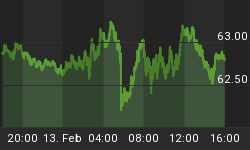A story has been echoing around the financial news for a few weeks. One article about it, It's official: America is now No. 2 by Brett Arends at MarketWatch, came to my attention. Arends asserts that the Chinese economy is now larger than the economy in the US. Here's what he said.
"We're no longer No. 1. Today, we're No. 2. Yes, it's official. The Chinese economy just overtook the United States economy to become the largest in the world."
With GDP data from the IMF, we can easily see that the US economy is bigger than China's. The IMF estimates 2014 GDP at $10.4T for China and $17.4T for the USA. So how does Arends claim the contrary? He uses different data that IMF adjusts. By this methodology, the Chinese economy is "really" $17.6T.
Really?
Although Chinese GDP is lower when measured in yuan and converted to dollars, Arends and others claim that this isn't right. Goods and services are cheaper in China. So they don't think we should convert yuan to dollars using the market exchange rate. They use a concept called Purchasing Power Parity (PPP). PPP is used to determine a different exchange rate for the yuan than the market rate. This is how they arrive at a "real" Chinese GDP of $17.6T.
We have long been trained to accept purchasing power as the means of adjusting the dollar from historical periods. For example, JP Morgan was worth $68M at his death in 1913. To calculate what that's worth in today's dollars, most people would refer to the Consumer Price Index. They use CPI to adjust the $68M figure from 1913 to a $1.6B modern value. As I wrote on Forbes, that approach is wrong. They should use gold which, unlike the dollar, is the same in 1913 as in 2014. Morgan was worth 3.4M ounces of gold, which is $4.1B today.
Adjusting the Chinese economy by PPP is simply applying the consumer price idea to a whole economy. If we use prices to adjust dollar figures from historical periods in the US, why not use them to adjust foreign but contemporary dollar amounts? If we can use consumer prices to measure the net worth of a man who died in 1913, then it seems like we can use them to measure the economic output of China also.
The approach is fatally flawed, because the value of a currency isn't derived from prices. As an analogy, suppose you are using a steel meter stick to measure a rubber band. When you stretch the rubber band, it gets longer. This is not equivalent to saying that the meter stick gets shorter. You do not measure meter sticks by how many rubber bands fit end to end. Measurement is one-way.
Money is the meter stick of economic value (though this principle is clouded in paper currencies, because they are falling). Prices rise or fall for non-monetary reasons. Prices may be cheaper in China for a variety of reasons, such as lower wages. Money measures these changes, not the other way around.
By the same principle, prices may be higher in New York than in Phoenix. Does anyone dare to say that these are different dollars? Should we adjust New York dollar downwards towards the Phoenix dollar, based on PPP? How about the Scottsdale dollar (Scottsdale is a ritzy suburb) vs. the south Phoenix dollar?
Standards of living certainly vary based on local prices, but that is a separate issue. The dollar is the same in New York as it is in Phoenix. We say that the dollar is fungible--a dollar is a dollar is a dollar, and each is accepted in trade the same as any other.
Arends uses the Starbucks venti Frapuccino as an example, which he says is cheaper in Beijing than in Minneapolis. A cup of coffee produced in China cannot be sent to Minneapolis where it will fetch a higher price. However, money is unlike coffee. It can go from Beijing to Minneapolis instantly. That's why there is one price for the yuan globally, but a different price for coffee on every street corner. Bulk commodities are of course more transportable than cups of coffee, but even they cost time and money to transport.
It's an essential property of money that it is quick and cheap to send it somewhere. Money will always move from where it has less value to where it is valued more highly. The result is that money's value is consistent everywhere.
This consistency allows us to convert the yuan to dollars, to compare Chinese GDP to American GDP. This is perfectly valid (well, if you accept that GDP itself is valid), because the comparison is instantaneous. We do not have to worry about the falling value of either currency that occurs over longer periods of time. We could use gold to compare the Chinese economy to the American, but it's not necessary in this.
The price of Frapuccino in China may be important to caffeine addicts who travel to Beijing, but it cannot be used to adjust a currency or a country's GDP.
Chinese GDP is a lot smaller than American GDP. Will that change? Maybe, but it's not the job of economists to embed such speculative assumptions into the data.
















